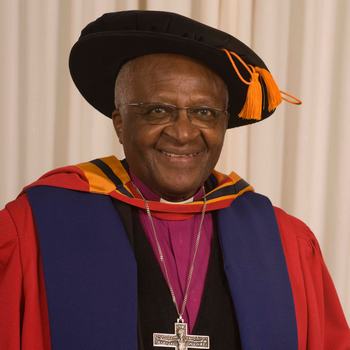DOCTOR OF EDUCATION (HONORIS CAUSA)
 Desmond Tutu was born on 7 October 1931 in Klerksdorp, in the former Transvaal. His father was a teacher, his mother relatively uneducated. The young Tutu was raised in an atmosphere of tolerance and sympathy where, he later says, "I never learnt to hate". At the age of 12 he first met Father Trevor Huddleston, an Anglican cleric in the Johannesburg township of Sophiatown who was an outspoken early critic of apartheid and a great influence on Tutu.
Desmond Tutu was born on 7 October 1931 in Klerksdorp, in the former Transvaal. His father was a teacher, his mother relatively uneducated. The young Tutu was raised in an atmosphere of tolerance and sympathy where, he later says, "I never learnt to hate". At the age of 12 he first met Father Trevor Huddleston, an Anglican cleric in the Johannesburg township of Sophiatown who was an outspoken early critic of apartheid and a great influence on Tutu.
Although he had planned to become a doctor, his parents could not afford to send him to medical school so after matriculating from Johannesburg Bantu High School, he chose to follow his father's career. He took a teacher's diploma at the Pretoria Bantu Normal College and studied for his Bachelor of Arts degree at the University of South Africa, from which he graduated in 1954. He was a teacher at his old high school in Johannesburg for a year and then moved to Munsieville High School, Krugersdorp, for three years. It was during this period that he married his wife, Leah.
In 1958, following the introduction of Bantu education, Tutu decided to enter the ministry in the Church of the Province of Southern Africa and became an ordinand at St Peter's Theological College, Rosettenville. He received his Licentiate in Theology in 1960 and was ordained to the priesthood in Johannesburg in 1961. Shortly afterwards he went to study in London, where he obtained the Bachelor of Divinity Honours and Master of Theology degrees while acting as a part-time curate.
In 1967 he returned to South Africa and joined the staff of the Federal Theological Seminary in Alice in the Eastern Cape and became chaplain at the University of Fort Hare. He moved to the National University of Lesotho in 1970 where he held the post of lecturer in the Department of Theology. This step was followed by a further spell in England as Associate Director of the Theological Education Fund of the World Council of Churches, based in Kent.
He remained an educator until 1972 when he became the first black person to hold the position of Dean of St Mary's Cathedral in Johannesburg. He held such a distinction once again three years later as the first black person to be General Secretary of the South African Council of Churches. In 1975 he was appointed as Anglican Dean of Johannesburg, also being the first black person to hold that position.
In 1984, Tutu received the Nobel Peace Prize in recognition of "the courage and heroism shown by black South Africans in their use of peaceful methods in the struggle against apartheid". The Nobel Committee asked that the awarding of the prize to Tutu be regarded "not only as a gesture of support to him and to the South African Council of Churches of which he is leader, but also to all individuals and groups in South Africa who, with their concern for human dignity, fraternity and democracy, incite the admiration of the world".
In 1985 Bishop Tutu was elected Bishop of Johannesburg and then in 1986 he was elected Archbishop of Cape Town. In 1987 he was elected as President of the All Africa Conference of Churches.
He has received many prizes and awards in addition to the Nobel Prize, notably the Order for Meritorious Service Award (Gold) presented by then President Nelson Mandela, the Archbishop of Canterbury's Award for Outstanding Service to the Anglican Communion, the Prix d'Athene (Onassis Foundation), the Family of Man Gold Medal Award and the Martin Luther King Jr Non Violent Peace Prize.
After the country's first multi-racial elections in 1994, President Mandela appointed Archbishop Tutu to chair the Truth and Reconciliation Commission, investigating the human rights violations of the previous 34 years. As always, the Archbishop counselled forgiveness and co-operation, rather than revenge for past injustice. In 1996 he retired as Archbishop of Cape Town and was named Archbishop Emeritus.
He was recently elected as Chair of an extraordinary collection of independent world leaders known as The Elders who will endeavour to resolve global problems - human rights being their first issue.
"When does compassion, when does morality, when does caring come in?" asks the man who first referred to South Africa as the Rainbow Nation, "I just hope that one day people will realise that peace is a far better path to follow."
One of the enduring memories of the struggle to end apartheid is Tutu's high-pitched yet melodious voice admonishing the former government and the world to end the discrimination. The response to the resistance was often brutal but Tutu retained a lightness to his approach that always extended a hand towards forgiveness and reconciliation. The Truth and Reconciliation Commission has become the model for other communities around the world trying to heal the fractures of social injustice. Nelson Mandela has said, "Sometimes strident, often tender, never afraid and seldom without humour, Desmond Tutu's voice will always be the voice of the voiceless."
In recognition of a truly great South African, it is an honour for NMMU to confer the degree of Doctor of Education (Honoris Causa) on DESMOND MPILO TUTU.